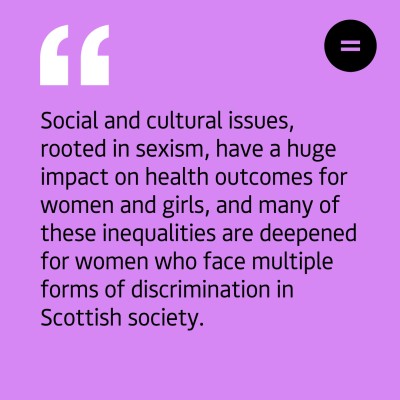Engender blog
Gender inequality in sickness and in health

Engender recently produced a briefing for the Scottish Parliament's Health, Social Care and Sport Committee about women's health inequalities. You can access the full briefing here, where we talk about the need for good quality data (of course!), the way that other structural forms of oppression impact on women's health and wellbeing, and provide recommendations to close the health gap. This blog focuses on the role that gender plays in women's health inequalities.
Systemic gender inequality has an enormous impact on health. Although women’s life expectancy exceeds that of men, women spend longer living with disability and ill health, and more women than men in Scotland live with a long-term health condition. Health issues that disproportionately affect women, or affect women differently to men, have historically lacked funding and professional focus, meaning that women’s health needs are not equally prioritised and understood across health services and more broadly.
A key part of improving women's health equality is in looking beyond sex-specific health issues such as endometriosis and abortion (important those these are), and at the role gender plays in health. Social and cultural issues, rooted in sexism, have a huge impact on health outcomes for women and girls, and many of these inequalities are deepened for women who face multiple forms of discrimination in Scottish society. For example:
- Women are more likely to experience poverty, to manage household budgets, and to go without necessities where resources are stretched.
- Job insecurity is noted by the World Health Organisation as an important social determinant of health, and women are more likely to be in part-time, low paid and unstable employment. Scotland’s gender pay gap persists at 10 per cent.
- Domestic abuse is a high-risk factor for depression, substance abuse, and numerous physical disorders. Domestic abuse is widespread in Scotland and primarily perpetrated by men against women.
- Carers, 60–70 per cent of whom are women in Scotland, are twice as likely to suffer from ill-health. Women are twice as likely to give up work to carry out unpaid care.
- Women continue to provide the majority of primary care for children and do the majority of household labour. Women, therefore, have less leisure time than men.
- Men spend considerably more time doing moderate to vigorous physical activity than women, on average 15.1 hours per week compared to 9.9 hours, respectively.
- Women are less likely to engage in ‘risky behaviour’ but are more likely to experience ‘invisible risks’ to their health, such as eating disorders and self-harm, which are often not adequately responded to.
- Perception of risk is also gendered – across Europe, cardiovascular disease is perceived to be low risk in women despite being the main cause of mortality for women in the region.
- Public space is highly gendered; poor consideration of safety and lighting in planning, and public transport systems that are not designed to meet women’s needs influence women’s use of the outdoor environment
Read our full briefing here.
Share this post on …
Comments: 0 (Add)
Sign up to our mailing list
Receive key feminist updates direct to your inbox:
